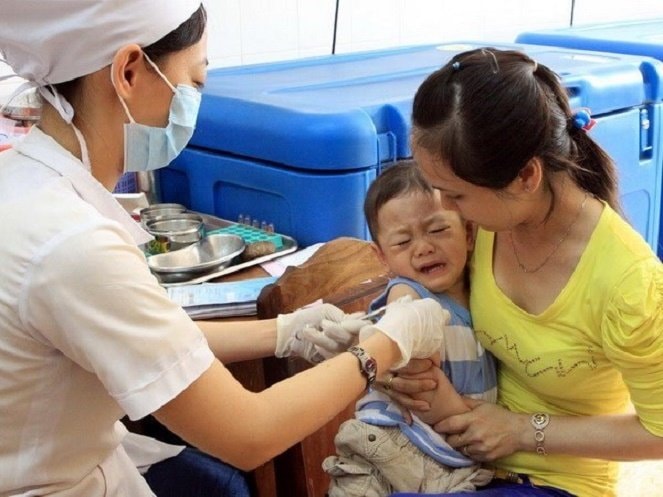Measures to avoid measles and rubella
The Ministry of Health said that in the coming time, the climate conditions will be very favorable for infectious diseases to arise and develop, especially diseases transmitted through the respiratory tract.
In that situation, on October 26, 2017, the Ministry of Health issued Official Dispatch No. 6507/BYT-DP to the Chairman of the People's Committee of the province and centrally-run city requesting attention and direction to strengthen the work of preventing and fighting winter-spring epidemics. The Department of Preventive Medicine - Ministry of Health recommended people to take measures to prevent and fight Whooping cough, Measles, and Rubella.
 |
8 ways to avoid measles and rubella
The Ministry of Health said that measles and rubella are acute infectious diseases caused by viruses. The disease is transmitted through the respiratory tract through droplets of secretions from the respiratory tract of infected people or through direct contact. Anyone can get measles and rubella and it is easily spread into an epidemic, especially in children who have not been fully vaccinated against measles and rubella. Symptoms of the disease: fever, rash and inflammation of the respiratory tract; can lead to serious complications such as otitis media, pneumonia, diarrhea, corneal ulcers, encephalitis, ... easily leading to death. To proactively prevent measles and rubella, the health sector recommends that people take the following measures:
1. Take children aged 9-12 months to a medical facility to receive the first dose of measles vaccine and the second dose when they are over 18 months old. Measles-Rubella vaccine is given to children aged 1-14 years old.
2. Regularly clean your nose, throat, and eyes every day
3. Do not let children share personal items (face towels, toothbrushes, glasses, cups, bowls, chopsticks, etc.), toys or objects that are easily contaminated with nasal secretions. Clean toys and objects suspected of being contaminated with the patient's nasal secretions with soap or common detergents and clean water.
 |
4. Clean floors, doorknobs, tabletops, chairs, common restrooms or surfaces of objects suspected of being contaminated with the patient's nasal secretions with soap or common detergents 1-2 times/day.
5. Disinfection and ventilation: Regularly open windows and main doors to let in sunlight and ensure good ventilation for your home, classroom, workplace, and daily treatment room.
6. Limit large gatherings and meetings, especially in cramped, poorly ventilated rooms in epidemic areas.
7. Limit contact with people who are infected/suspected of being infected. When in contact with sick people, wear medical masks and personal protective equipment. Pregnant women should absolutely not come into contact with people infected with rubella.
8. Notify medical facilities when showing symptoms of illness for timely examination, treatment and medical isolation instructions.
Prevent whooping cough with 5 measures
Whooping cough is an acute infectious disease caused by bacteria, transmitted through the respiratory tract. The disease is common mainly in children 1-6 years old. The younger the child, the more severe the disease. Symptoms of the disease: fever, severe coughing in prolonged bouts and wheezing, runny eyes, runny nose, accompanied by vomiting with white and sticky phlegm. Currently, there is a vaccine to prevent the disease. To proactively prevent Whooping cough, the health sector recommends that people take the following measures:
1. Take the initiative to vaccinate children fully and on schedule.
2. Ensure housing, kindergartens, and classrooms are clean, airy, and have enough light.
3. Implement personal hygiene measures for children such as covering their nose and mouth when sneezing.
4. Eat a balanced diet and proper nutrition.
5. When there are signs of illness or suspected whooping cough, children must be taken to a medical facility for timely examination, treatment and isolation.
According to SK&DS
| RELATED NEWS |
|---|
